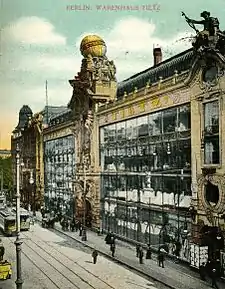Hermann Tietz
Hermann Tietz was a German merchant of Jewish origin. Tietz was born on 29 April 1837, in Birnbaum an der Warthe near Posen (today Międzychód, Poland) and died on 3 May 1907 in Berlin). He was buried in the Weißensee Cemetery.
Hermann Tietz | |
|---|---|
| Born | 29 April 1837 Birnbaum an der Warthe, Poland |
| Died | 3 May 1907 Berlin, Germany |
| Nationality | German |
| Occupation | Merchant |

Tietz was the first to carry out the idea of the department store in Germany and founded the chain store later known as "Hertie", which existed until its takeover by Karstadt in 1993.
In 1882, the first department store of Tietz was opened in Gera (Thuringia, Germany) by his nephew Oskar Tietz. Oskar's brother Leonhard Tietz later founded his own chain store ("Kaufhof"). After stores in smaller towns like Bamberg, Erfurt, Rostock, Stralsund und Wismar had been successful, Tietz established his first department store in Berlin. In 1900, Herrmann Tietz opened a store in Leipziger Straße, where it was located close to the department store Wertheim, the biggest store in Europe at the time. In 1904, Tietz opened another luxurious store at Alexanderplatz. The impressive and palace-like stores were designed to offer the customers a unique shopping experience. Another example is the Alsterhaus in Hamburg (established in 1912). With ten department stores Tietz was the largest chain in Berlin. In 1927 some 13,000 employees worked in the Tietz department stores.
The Tietz family divided the German market into two spheres of interest. Herrmann and Oscar Tietz concentrated on the South and East, while Leonhard Tietz ("Kaufhof") was active in the West and in Belgium.
In the Third Reich, all businesses of the Tietz family were "Aryanized" (i.e. seized and given to new owners) and the family members emigrated. In 1933, Georg Karg, the new owner, changed the company’s name to the less Jewish-sounding "Hertie Department Stores" as an abbreviation of Hermann Tietz.[1]
Hertie was acquired by its competitor Karstadt in 1994,[2] and the Hertie stores were gradually converted to Karstadt outlets. In 2007 Hertie made a brief comeback. Due to a crisis of the Karstadt department store group, Karstadt dissolved 74 of their stores. These stores were the smallest ones and been unprofitable at least. The "new" relaunched Hertie department store group re-opened them under the name "Hertie". Today all former business relations to Karstadt have been severed and Hertie is independent. Hertie had planned to expand, but on 20 May 2009 it was decided that all 54 Hertie department stores were to close. [3]